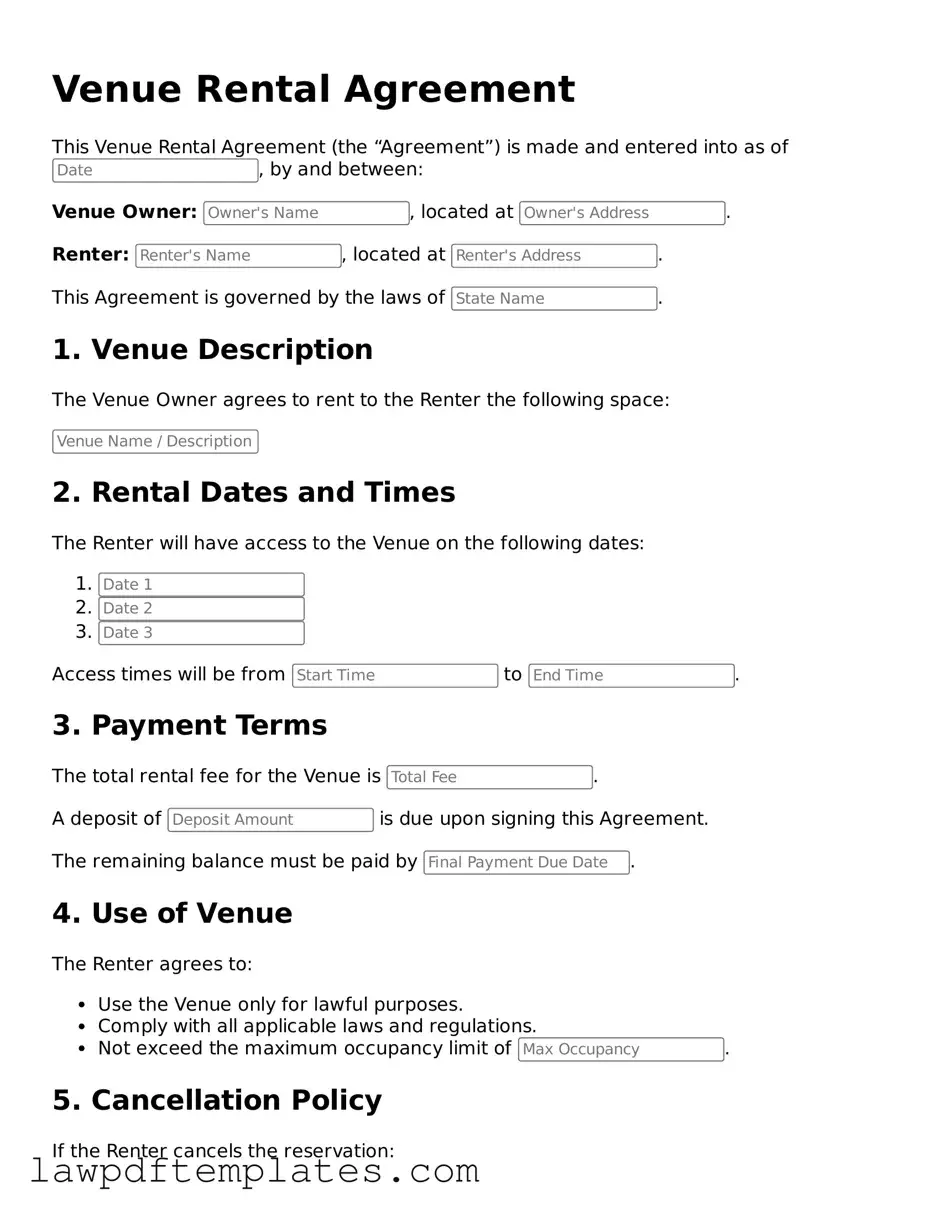Attorney-Approved Venue Rental Agreement Document
Form Breakdown
| Fact Name | Description |
|---|---|
| Purpose | A Venue Rental Agreement outlines the terms under which a venue is rented for events, ensuring both parties understand their rights and responsibilities. |
| Key Components | This agreement typically includes details such as rental dates, payment terms, cancellation policies, and liability clauses. |
| Governing Law | The agreement is subject to state laws. For example, in California, it falls under the California Civil Code. |
| Security Deposit | Most agreements require a security deposit to cover potential damages or cancellations, which is refundable under certain conditions. |
| Insurance Requirements | Venues often require renters to carry liability insurance to protect against accidents or damages during the event. |
| Modification Clause | Any changes to the agreement must be made in writing and agreed upon by both parties to be enforceable. |
Sample - Venue Rental Agreement Form
Venue Rental Agreement
This Venue Rental Agreement (the “Agreement”) is made and entered into as of , by and between:
Venue Owner: , located at .
Renter: , located at .
This Agreement is governed by the laws of .
1. Venue Description
The Venue Owner agrees to rent to the Renter the following space:
2. Rental Dates and Times
The Renter will have access to the Venue on the following dates:
Access times will be from to .
3. Payment Terms
The total rental fee for the Venue is .
A deposit of is due upon signing this Agreement.
The remaining balance must be paid by .
4. Use of Venue
The Renter agrees to:
- Use the Venue only for lawful purposes.
- Comply with all applicable laws and regulations.
- Not exceed the maximum occupancy limit of .
5. Cancellation Policy
If the Renter cancels the reservation:
- 30 days or more before the event: Full deposit refund.
- Less than 30 days: Deposit is non-refundable.
6. Liability and Insurance
The Renter is responsible for any damages to the Venue and must provide valid insurance coverage.
7. Signatures
By signing below, both parties agree to the terms outlined in this Venue Rental Agreement.
Venue Owner Signature: ____________________
Renter Signature: ____________________
Common mistakes
When filling out a Venue Rental Agreement form, many people overlook crucial details that can lead to misunderstandings or complications later on. One common mistake is failing to read the entire agreement thoroughly. Skimming through the document may cause individuals to miss important clauses regarding cancellation policies, payment schedules, and liability issues. Understanding the terms is essential to avoid surprises down the line.
Another frequent error is providing inaccurate information. Whether it’s the date of the event, the number of guests, or the type of setup required, incorrect details can create logistical issues. Always double-check the information before submitting the form. A simple typo can lead to significant problems on the day of the event.
People often neglect to clarify their needs and expectations in the agreement. For example, if specific equipment or services are required, it’s important to state these clearly. Leaving these details vague can lead to misunderstandings about what the venue will provide, potentially resulting in unmet needs during the event.
Additionally, many individuals forget to inquire about additional fees. While the rental price may seem straightforward, there could be hidden costs related to cleaning, security, or overtime. Failing to ask about these fees can lead to unexpected expenses that strain the budget.
Another mistake is not paying attention to the payment terms. Some agreements require a deposit, while others may have different timelines for full payment. Missing these deadlines can jeopardize the reservation. Always ensure that payment terms are clear and understood to avoid losing the venue.
Lastly, some people overlook the importance of signatures. An unsigned agreement is not legally binding. It’s crucial to ensure that all parties involved have signed the document before considering it final. This simple step can prevent disputes and ensure that everyone is on the same page regarding the terms of the rental.
Consider Popular Types of Venue Rental Agreement Documents
Hunting Lease Word Document - Informs hunters about local wildlife regulations that may affect the lease.
When entering into a rental agreement, it is crucial for both landlords and tenants to utilize a comprehensive Lease Agreement form that clearly articulates the expectations and responsibilities of all parties involved, which can be conveniently achieved using resources such as Fast PDF Templates.
Wedding Contracts - Details on the parking arrangements for guests are provided.
Lease Agreement for Room Rental - Clarifies expectations for utilities and other expenses.
